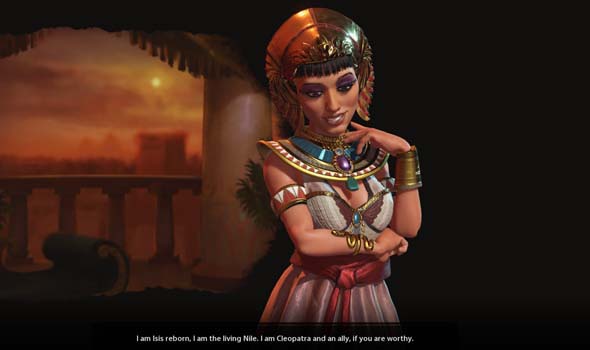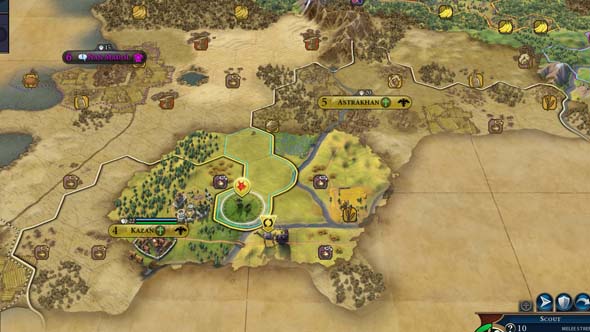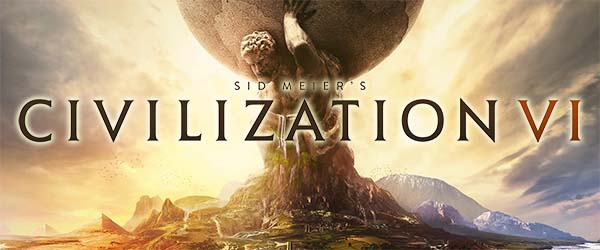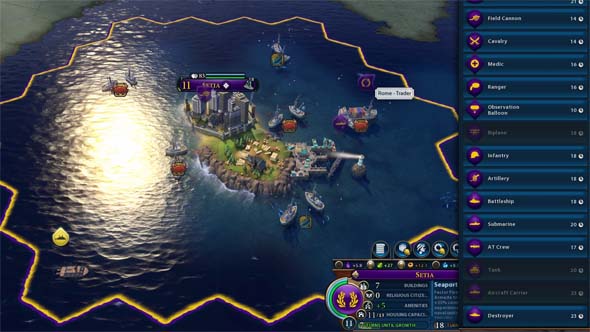
The announcement trailer for Sid Meier's Civilization VI made me very excited. Not just because there was a new iteration of my favorite PC game franchise, but also because the message of the trailer made me excited for the possibility that Civilization VI would take a much more humanist and globalist approach to its gameplay and victory conditions.
The Civilization games have always had a very optimistic tone, treating human development as being constantly progressing forward. Growing your civilization and building more things is almost always better. For the most part, Civilization treats human history as a constant forward march towards a better, more prosperous tomorrow.
This is despite the games including mechanics for "Dark Ages", climate change, nuclear fallout, occasionally pandemics and plagues, and so forth. Regardless of these mechanics, the civilizations of the game never regress, unless it's by the sword or gun of a conquering civilization, in which case, that other civilization is glorified. Climate change or nuclear winter can run rampant and render the surface of the Earth borderline uninhabitable for modern human life, but a civilization can still accumulate enough science or tourism or faith or diplomatic votes to win one of the various victories, or they can be the sole surviving civilization, presiding over a barren wasteland. But it's still a win.
Civilization is a game about cutthroat nationalism.
Despite vague gestures towards diplomatic cooperation and solving global crises, Civilization is, at its core, a game of competitive, cutthroat, zero-sum nationalism. This design ethos is probably the result of Civilization's inspirations coming from competitive board games like Avalon Hill's Civilization and Risk. "Our country is better than your country," and the whole game is an exercise in proving that. Further, one civilization's success must come at the expense of every other civilization's failure, even if those civilizations are friends or allies. One civ wins; all others lose. Every decision made is done to move your civilization closer towards one of those victory conditions, and every diplomatic agreement, trade deal, or alliance that you strike is only a temporary means to that end.
So what did Civ VI's trailer do to change my expectations for that game?
This essay is also available in video format on YouTube.
The trailer
Well, first, it's important to know how previous trailers and intro cinematics for Civilization games had introduced their respective games. Usually, they emphasized a single nation or leader doing great things. Winning wars, building wonders, developing advanced technologies, and so forth. And they usually ask the viewer: "How will you run your civilization?" and "Will your civilization stand the test of time?"
The trailer for Civilization VI takes a different approach. Let's take a look:
Civilization VI's announcement trailer celebrates the collective achievements of all of humanity.
"We are the explorers, the inventors, the architects of change, the builders of a better tomorrow.
We strive, we dream, we inspire, always towards something greater.
All the odds we defy, the risks we take, the challenges we endure, only make us stronger.
There's no end to our imagination, and no limit to civilization."
- Sean Bean narrating Civilization VI announcement trailer
Notice the language that is used. The Civ VI trailer uses plural language such as "we", "us", and "out". "We are the builders of a better tomorrow.". "the challenges we endure, only make us stronger." "There is no end to out imagination, and no limit to civilization.". And so forth. The trailer for Civilization VI isn't a celebration of one civilization or leader rising above all others and being crowned the "greates" civilization; it's about the collective achievement of all of humanity -- not a civilization, but all human civilization!
It's a beautifully humanistic expression that emphasizes plurality and doesn't elevate any one culture or race or nation above any other. It celebrates the collective technological advancements, engineering, art, and struggles of all of humanity, without implying that any one nation or group has the best stuff. It emphasizes that we can overcome challenges by working together, and come out the other side stronger for it. It implies that when we cooperate to build something or solve a problem, the result will be better than what any individual entity can accomplish. [More]

Civilization VI's first expansion, Rise and Fall just launched this past weekend. The expansion does make some welcome enhancements to alliances that makes peaceful relations with other civs much more appealing. However, these enhancements do not address two of my most fundamental complaints with Civilization's diplomacy system in general: that it does not allow for truly cooperative victories, and that it does not really provide the player with any way to influence an A.I. civ's behavior. I've already written about ideas for cooperative victories for both Beyond Earth and for the core Civilization games, so I won't go into that again here. Instead, today's blog will focus on the second of my major hang-ups with diplomacy: that you simply cannot provide A.I. civs with any indication of what you consider friendly or hostile behavior.
Diplomacy has always been one of the major stumbling blocks of the Civilization games. Each game has certain mechanics or features that are good ideas on paper, but none of the games have ever really had a diplomacy system that really seems to work the way that it is intended, and which provides consistent behavior from the A.I.s. A.I.s are often erratic in their behavior -- both between games, and within a single game.

A single unit can be the difference between Cleopatra's abject disgust and her goo-goo-eyed adoration.
Civ VI introduces the agendas, which sound like a good idea on paper. It gives each leader an element of personality. They have things that they like, and things that they don't like. The problem is that these agendas lead to wild swings in an A.I.'s attitude, often based on rather trivial (and sometimes counter-intuitive) actions from the player. Often times the thresholds for activating these agendas are not entirely clear. Cleopatra tells me that my army is too weak and pathetic, and so she has a heavy negative modifier with me. Then I build a single Swordsman a couple turns later, and now suddenly my army is powerful enough to warrant her admiration, and she's looking me up and down with those goo goo eyes.
There's other legacy issues with diplomacy. The biggest one is the inability to ever warn another civ that their actions might lead to war. The denouncement mechanic of Civ V was a decent start, but since you could never provide a specific reason for your denouncements, they never seemed to have much weight in changing another civ's behavior. In a multiplayer game, you could always use the chat to inform other players' of your diplomatic desires, but there has never been any method for accomplishing this with A.I. civs in single-player.
Since the A.I. has no real clue why it is being denounced, there's no way for it to change its behavior. There's also no way for other A.I.s to understand if your denouncement or declaration of war is actually justified or not.

You can denounce a civ, but the A.I. won't really have any clue why they're being denounced.
Civilization VI tried to rectify this with the Casus Belli system, but that system also stumbles... [More]
892bf8a7-123e-470d-b094-32cec0a5eb7a|2|5.0
Tags:Sid Meier's Civilization, Civilization, Civilization V, Civilization VI, Civilization VI: Rise and Fall, leader, diplomacy, casus belli, friendship, agenda, denouncement, act of war, war, quest, city state, alliance, victory, AI

Earlier today, I served as a guest host for the Civilization podcast Polycast, episode 295. I joined regular hosts DanQ, Makahlua, MadDjinn, and TheMeInTeam. The episode covered a handful of topics, ranging from the new religion mechanics introduced by the fall 2017 patch, to a proposal for athletes to be a type of great person, the new Civilization: A New Dawn board game, to the issue of micro-transactions (or "Recurrent Consumer Spending" as Take-Two Interactive CEO, Strauss Zelnick calls it), and more.
If you missed the live broadcast, then the edited archive version will be released on PolyCast's website next Saturday (December 2). I'll update this post with a link once the archive is updated.
"Recurrent Consumer Spending"
"Recurrent Consumer Spending" was one of the primary topics of the previous episode (PolyCast #294), and so we discussed it again as part of a discussion on feedback from last week's episode. Micro-transactions (and loot boxes in particular) are a hot topic in gaming of late, especially after the fiasco that was EA's launch of Star Wars: Battlefront II. Games pundit Jim Sterling has made micro-transactions an almost weekly issue in his Youtube podcast The Jimquisition. Sterling has been comparing loot boxes to gambling for months, and recently, some European regulatory agencies have started to evaluate whether loot boxes should legally be classified as a type of gambling. As someone who has previously worked for a gambling company, I am aware of how compulsive impulses are used to keep gamblers addicted to a particular game, and I definitely believe that the current implementation of loot boxes in games like Shadow of War, Call of Duty, and Star Wars: Battlefront does try to capitalize on those same addictive impulses, and so should probably be regulated similarly to gambling. I don't want micro-transactions in my games at all, but I don't necessarily think that such things should be illegal per se. But they should be regulated, and I do think that the game boxes should clearly indicate to parents that the game includes "gambling-like elements" (or some other warning).
Jim Sterling has been making a fuss about micro-transactions and loot boxes for months.
WARNING: May not be appropriate for younger or more sensitive viewers.
More importantly (for me), however, is the concerns for what micro-transactions do to the actual game. Just last night, I spent something like 4 hours in Shadow of War grinding my character and orc captains up to a point that I could siege the castle in Act II. I played every side mission available in the chapter, and then still had to do some Nemesis missions, in order to get Talion up to level 20 and unlock the ability to assign a third uruk captain to my siege assault. That third captain was essential to get my siege level up above the level of the defenders. I'm not sure if that was necessary, but I didn't want to risk having my captains killed during the attack. I actually happen to really like Brûz The Chopper, so I didn't want him dying because my siege was under-leveled. This is just Act II! I can't imagine how grindy the game might become during the later acts! And all this extra grind in the campaign is a direct result of the inclusion of the game's War Chest (i.e. loot boxes). You can spend real-life money to buy random orc captains to use in your sieges or to defend your captured forts. So the whole game is balanced such that it's just enough of a grind to encourage people to spend money to speed things along by buying the War Chest.
Well, Take-Two CEO Strauss Zelnick has said that he wants every game in 2K's library to include "recurrent consumer spending". That would include my beloved Civilization... [More]
8f53a504-5bbb-4626-ba4a-56406fa073a4|0|.0
Tags:PolyCast, Civilization, Sid Meier's Civilization, Civilization III, Civilization IV, Civilization: Colonization, Civilization V, Civilization VI, Firaxis, podcast, DanQ, Makahlua, TheMeInTeam, MadDjinn, micro-transaction, gambling, Strauss Zelnick, Take-Two Interactive, 2K Games, Jim Sterling, Jimquisition, Middle-Earth: Shadow of War, Brûz The Chopper, board game, Sid Meier's Civilization the Board Game, Sid Meier's Civilization: A New Dawn

This past weekend, I was once again honored to be invited onto the Polycast podcast about the Civilization games. This was my third time on the show since the release of Civilization VI (back in November). Those two episodes were focused more about initial impressions of the game. This time, we got to have some more substantive discussions.
The 1-hour archive of the episode can be streamed from civcomm.civfanatics.com/polycast/polycast/season9/episode223.mp3:
This archived episode is edited down to 1 hour (from a 2-hour recording), so not all the following topics may be included in this particular episode. The remaining topics may be included in later episodes, so be sure to check back at Polycast.net if you want to hear it all!
The bulk of our discussions were focused around a handful of Civfanatics forum topics regarding criticisms and suggestions for enhancing the district mechanics. The first thread was about users' ideas for possible districts in any inevitable expansion for the game. This gave me an opportunity to link back to a previous blog that I had written about my own ideas for new districts (and other ways to make better use of the game's map). Ideas from other users ranged from new districts focused around diplomacy and envoy-generation, to railroad hub districts, a fortress / castle district, espionage district, and (of course) a canal district. Other users pitched the idea of stacking multiple districts into a single tile. This idea seemed unfavorable to the Polycast hosts (as well as myself), as it generally undercuts the fact that "unstacking" cities was a core design philosophy of Civ VI. However, it is worth pointing out that "unstacking" units was the core design philosophy of Civ V, but Civ VI added limited stacking back into the series. So back-pedaling on a philosophy of unstacking is not without precedent.

Russia is pretty much the only A.I. that places its districts well, due to its free extra border expansion.
The next topic was a thread about removing districts. The general consensus seemed to be that we were all in favor of having a city project to remove or relocate districts, if -- for nothing else -- but to relocate poorly-placed districts in captured A.I. cities. The last forum topic discussion was about user dunkleosteus' ideas about rethinking districts. I think we all agreed that the poster's ideas seemed to be far too complicated, but there are some ideas of merit in there. Having more options for further specializing districts and cities would be fine, and we'd all like to see more bonuses based on nearby districts and the map so that district placement doesn't feel quite so ... mechanical... [More]
47ec6e63-fca3-483e-8260-ed72b3b0b7f6|0|.0
Tags:Civilization, Sid Meier's Civilization, Civilization V, Civilization VI, PolyCast, Firaxis, podcast, DanQ, Makahlua, TheMeInTeam, MadDjinn

I really like Civilization VI! Of course, it has its share of nagging problems (some of which have been resolved already) - any game of this size and scope is likely to have issues at release. I've already been thinking of some ideas for how the game could be improved in expansions and DLC, and I'd like to spend a few posts to share some of those ideas with you now.
In my review of the game, I mentioned that oceans feel like they've regressed a bit since Beyond Earth: Rising Tide, in that they've returned to feeling like lifeless dead space on the map. Even though they're more important for Holy Sites and Campuses, mountains are also still mostly dead space on the map. They act as obstacles, and that's basically it. In expansions and DLC, I would like to see some of this space become more alive and useful. I'd like to spend this first suggestion post going over some ideas that I have for expanding the ocean mechanics, and for taking advantage of more of the map's dead space.
I have posted a link to this blog on Civfanatics at:
https://forums.civfanatics.com/threads/using-more-of-the-dead-space-in-the-map.610171/.
Feel free to discuss through the comments on this post, or via the linked forum topic!
Improve coastal cities
I'm very underwhelmed with coastal cities right now. Water tiles have very little utility. They provide small yield, can't have districts (other than a single harbor per city), and generally lack production. Coastal cities with lots of water are, thus, very unproductive and not really worth building. I think there's a couple ways to resolve this.
Harbors could provide a small amount of production. Or perhaps Harbors could act similarly to lighthouses from Civ V and provide production on sea resources. Or they could provide production on all adjacent sea tiles (so that placement is still important, and more of those empty sea tiles become useful and worth working, and you actually have to work them in order to get the benefit (as opposed to the Harbor just having an adjacency bonus). If we want to only use adjacency bonuses, then another alternative might be for Harbors to provide +1 production per adjacent coastal resource and +0.5 gold per adjacent water tile. That way, even cities that don't have clustered water resources can still have valuable locations for harbors.

Coastal and island cities lack production and have limited space to build districts.
Another way to improve coastal cities would be to have some more early policies that benefit coastal cities. Perhaps the Maritime Industries policy could be changed to "+1 production in coastal cities, and +1 production from Harbors". Alternatively, Maritime Industries could be similar to the Veterancy policy, and it could provide "+33% production towards Harbor districts and buildings for that district". Or we could have policies that do both! A new policy could be added that provides the bonus production for early naval units. Maybe there can even be a whole extra early-game civic (maybe called "Seafaring" or "Way-finding") that has some policies and buffs towards coastal and island civilizations.
The lack of production for coastal cities could also be offset by giving them more gold and/or food for growth (in order to support a specialist economy)... [More]
0a6b7d05-286b-42c2-b6f9-dbbeca807f1a|1|5.0
Tags:Sid Meier's Civilization, Civilization VI, civilization, strategy, map, ocean, coast, beach, boardwalk, fishery, wind farm, island, mountain, observatory, astronomy, ski resort, tourism, tunnel, canal, navy, cities, Polynesia, way-finding, national park, naturalist, Civilization: Beyond Earth: Rising Tide
|

| 12 | | | | | | | 60 | | 11 | | | | | | | 55 | | 10 | | | | | | | 50 | | 09 | | | | | | | 45 | | 08 | | | | | | | 40 | | 07 | | | | | | | 35 | | 06 | | | | | | | 30 | | 05 | | | | | | | 25 | | 04 | | | | | | | 20 | | 03 | | | | | | | 15 | | 02 | | | | | | | 10 | | 01 | | | | | | | 05 |
|